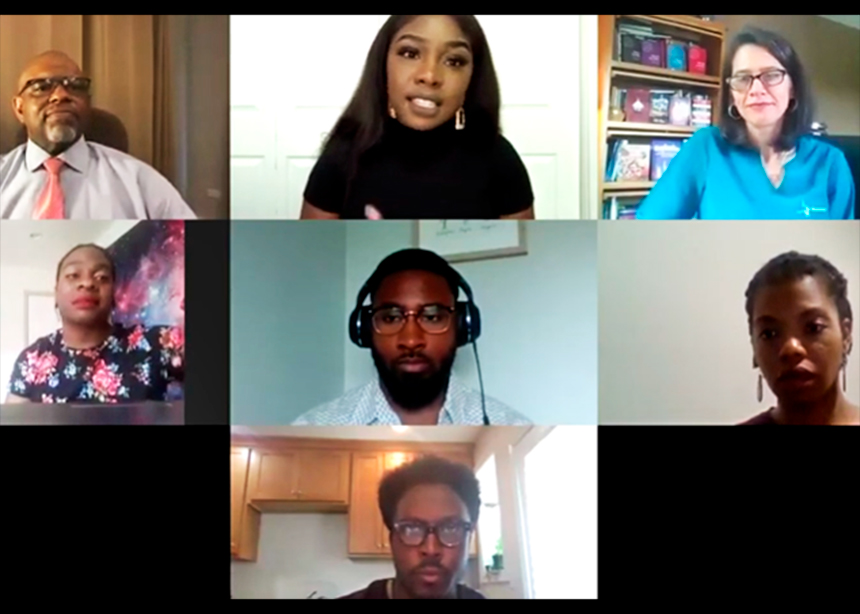Acknowledging that “the church has been awakened and reawakened to racial injustice in our midst after the death of George Floyd,” MennoMedia, an agency of Mennonite Church Canada and MC U.S.A., dedicated one of its ‘adaptive church webinars’ to addressing racism in churches.
The July 9 webinar, entitled “Expanding our witness: Equipping ministry for anti-racist change,” was hosted by Amy Gingerich, executive director and publisher of MennoMedia, which provides resources from an Anabaptist perspective.
Dennis R. Edwards, a Black professor, writer and pastor, moderated the conversation with five black panelists.
Delonte Gholston, senior pastor at Peace Fellowship Church in Washington, D.C., said that white people “are in a Nicodemus moment,” referring to the Pharisee who came to Jesus at night. Gholston said the invitation of Jesus to Nicodemus still stands: “Be born again . . . be baptized and come out new.” But, he wondered if white people are “willing to go down to the water and come up new.”
Johise Namwira, a human rights activist and member of Fort Garry Mennonite Fellowship in Winnipeg, said whites have to acknowledge that “Christianity was used as a tool of colonization,” and that some Christians have been “complicit in the construction of white supremacy and the subsequent dehumanization . . . of Africans.”
Panelists described how systemic racism is vast and capable of remaking itself to benefit those in power.
Namwira said “racism is a learned behaviour” that has been the foundation of North American culture for 400 years, which means that everyone “has some form of racial bias.” It “thrives on strong marketing” that reinforces notions of white superiority while creating a single, negative story of Blacks. She cited a TED Talk called “The danger of the single story,” by Chimamanda Ngozi Adichie, a Nigerian writer, as a helpful resource.
Reflecting on the history of anti-racism, Leah Fulton, a writer, consultant and doctoral student in higher education and African American studies, said, “We have kept ourselves whole [by] affirming our identity from before colonization,” an identity that “has been pathologized” in western culture and theology and “used for building the foundation of racist hierarchy.”
Anti-racism means pushing back against the forces of oppression, said Chantelle Todman, a community activist and intercultural leadership coach with MC U.S.A.’s new Mosaic Mennonite Conference. But it also means finding the “blessing and birthright” in black identity. She said that “not allowing the theft of my preciousness” is important in the face of systems “meant to dehumanize us.”
When asked to describe entry points into anti-racism work in the church, Todman told participants that there is a “kaleidoscope of efforts” already out there to get involved with in their neighbourhoods. “Take stock of what is already in front of you . . . the stories, the witnesses, the calls to action,” and “be faithful to . . . what you have already heard.”
Gholston said, “Knowing where you are in the story” is important. “God is calling [white Christians] to know your privilege and lay your power down.” He added, white Christians need to “know the lens [you] are reading Scripture with,” noting that black people “read Jesus as a marginalized, oppressed person . . . who served the marginalized and oppressed.”
Jerrell Williams, pastor of Salem Mennonite Church in Oregon, concurred. He said that anti-racism work involves “reclaiming the biblical text . . . taking back what is ours . . . reading Scripture differently.” He cited Hagar’s story as an example, noting that God is with Hagar, an Egyptian woman, and offers her the same promise as Abraham.
Williams wants to see predominantly white churches “get on board . . . with what Black people are calling for.” “Be on our side,” he said. “We are telling you all what we want. . . . We are asking for real, structural change. . . . Everything else is nice gestures” that deflect from real change.
Being upset by rioting—but not by the conditions that led to the inclination to riot—Fulton called “respectability politics” that deflect from the actual violence of racism.
The panelists also addressed how white people can learn from Blacks without taxing their energy. Todman said, “It’s a distraction tactic to ask people of colour to figure out how to dismantle something that we didn’t build. . . . We are not the architects of this thing.”
Gholston said that Christians are being called to be “holy midwives,” referencing the Hebrew women in the Exodus story who, “in the face of a colonial and oppressive power” say “no” when instructed to kill the Israelite baby boys. “Let’s be midwives of a new kind of Christianity . . . responsible to birth a new reality,” he said.
According to Gingerich, MennoMedia plans to make the new book by professor, writer and activist Drew Hart, Who Will Be a Witness? Igniting Activism for God’s Justice, Love and Deliverance, available to all pastors in MC Canada and MC U.S.A. churches. The book is due out on Sept 1.
Do you have a story idea about Mennonites in Eastern Canada? Send it to Janet Bauman at ec@canadianmennonite.org.









Leave a Reply
You must be logged in to post a comment.